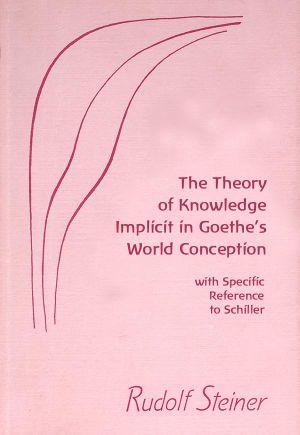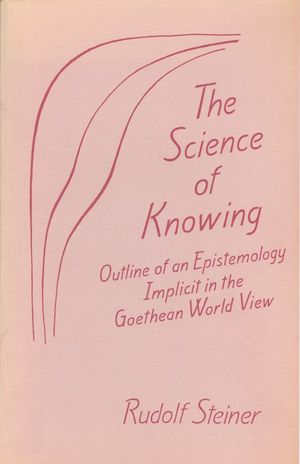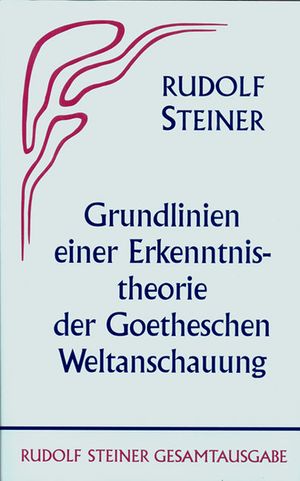GA 2



The Theory of Knowledge Implicit in Goethe's World Conception with Specific Reference to Schiller
Grundlinien einer Erkenntnistheorie der Goetheschen Weltanschauung, mit besonderer Rücksicht auf Schiller (1886)
Rudolf Steiner wrote the following about this early work almost forty years after it was written:
„As I place it before me again today, it also appears to me as the epistemological foundation and justification of all that I have later said and published. It speaks of a path of cognition that clears the way from the sensuous world into the spiritual.“ (Lit.:GA 2, p. 11)
The central idea of the epistemology of Goethe's worldview, as expounded by Rudolf Steiner, is that the inner essence of the world expresses itself directly in human thinking:
„One degrades thinking if one deprives it of the possibility of perceiving in itself entities which are inaccessible to the senses. In addition to the qualities of the senses, there must be another factor in reality that is grasped by thinking. Thought is an organ of the human being which is destined to observe something higher than the senses can offer. That side of reality is accessible to thought of which a mere sense being would never know anything. It is not there to regurgitate sensuality, but to penetrate that which is hidden from it. The perception of the senses provides only one side of reality. The other side is the thinking apprehension of the world.“ (Lit.:GA 2, p. 62f)
„Our epistemology leads to the positive result that thinking is the essence of the world and that individual human thinking is the single manifestation of this essence.“ (Lit.:GA 2, p. 78)
Contents
Cover Sheet
Contents
Preface to the New Edition of 1924
Foreword to the First Edition
A. PRELIMINARY QUESTIONS
1. The Point of Departure
2. The Science of Goethe According to the Method of Schiller
3. The Task of Science
B. EXPERIENCE
4. Determining the Concept of Experience
5. An Indication as to the Content of Experience
6. Correcting an Erroneous Conception of Experience as a Whole
7. Calling upon the Experience of Every Single Reader
C. THINKING
8. Thinking as a Higher Experience within Experience
9. Thinking and Consciousness
10. The Inner Nature of Thinking
D. SCIENCE
11. Thinking and Perception
12. Intellect and Reason
13. The Activity of Knowing
14. The Ground of Things and the Activity of Knowing
E. THE ACTIVITY OF KNOWING NATURE
15. Inorganic Nature
16. Organic Nature
F. THE HUMANITIES
17. Introduction: Spirit and Nature
18. Psychological Knowing Activity
19. Human Spiritual Activity (Freiheit)
20. Optimism and Pessimism
G. CONCLUSION
21. The Activity of Knowing and Artistic Creativity
Notes to the New Edition, 1924
Literature
- Rudolf Steiner: The Theory of Knowledge Implicit in Goethe's World Conception with Specific Reference to Schiller, translated by William Lindeman, CW 2, Anthroposophic Press 1985, ISBN 0-91014-294-7 rsarchive.org
- Rudolf Steiner: The Science of Knowing. Outline of an Epistemology Implicit in the Goethean World View. With Particular Reference to Schiller, translated by William Lindeman, Mercury Press, Spring Valley/New York 1988, ISBN 0-936132-97-3 rsarchive.org
German
- Rudolf Steiner: Grundlinien einer Erkenntnistheorie der Goetheschen Weltanschauung. 8. Auflage. Rudolf Steiner Verlag, Dornach 2002, ISBN 3-7274-0020-X; Tb 629, ISBN 978-3-7274-6290-0 English: rsarchive.org German: pdf pdf(2) html mobi epub archive.org
- Rudolf Steiners Wissenschaftsbegriff im Gespräch mit der Gegenwart. Beträge zu den >Grundlinien einer Erkenntnistheorie der Goetheschen Weltanschaung<, mit Beiträgen von Günter Röschert, Lorenzo Ravagli, Reinhard Falter und Roland Halfen. Zeitschrift Die Drei, Beiheft 4/Juni 1991
Original editions
 |
References to the work of Rudolf Steiner follow Rudolf Steiner's Collected Works (CW or GA), Rudolf Steiner Verlag, Dornach/Switzerland, unless otherwise stated.
Email: verlag@steinerverlag.com URL: www.steinerverlag.com. Index to the Complete Works of Rudolf Steiner - Aelzina Books A complete list by Volume Number and a full list of known English translations you may also find at Rudolf Steiner's Collected Works Rudolf Steiner Archive - The largest online collection of Rudolf Steiner's books, lectures and articles in English. Rudolf Steiner Audio - Recorded and Read by Dale Brunsvold steinerbooks.org - Anthroposophic Press Inc. (USA) Rudolf Steiner Handbook - Christian Karl's proven standard work for orientation in Rudolf Steiner's Collected Works for free download as PDF. |
